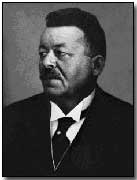Primary Documents - Friedrich Ebert on the First Post-Imperial German Government, 10-17 November 1918
 With Germany actively
seeking an armistice and revolution threatening, calls for
Kaiser
Wilhelm II to abdicate grew in intensity. Wilhelm was
himself deeply reluctant to make such a sacrifice, instead expressing a
preference to lead his armies back into Germany from the Western Front.
Upon being informed by his military advisers that the army could not be
relied upon not to harm him
Wilhelm abandoned the notion.
With Germany actively
seeking an armistice and revolution threatening, calls for
Kaiser
Wilhelm II to abdicate grew in intensity. Wilhelm was
himself deeply reluctant to make such a sacrifice, instead expressing a
preference to lead his armies back into Germany from the Western Front.
Upon being informed by his military advisers that the army could not be
relied upon not to harm him
Wilhelm abandoned the notion.
Wilhelm's abdication was announced by Chancellor Prince Max von Baden in a 9 November 1918 proclamation - before Wilhelm had in fact consented to abdicate (but after Social Democrat Philipp Scheidemann had announced the Kaiser's departure from the balcony of the Reichstag). Faced with a fait accompli Wilhelm formally abdicated and went into exile in Holland. His abdication proclamation was formally published in Berlin on 30 November 1918.
Faced with public criticism over the nature of Wilhelm's abdication German Army Chief of Staff Paul von Hindenburg issued a statement on 20 March 1919 explaining the sequence of events and defending the Kaiser's role.
In the wake of the Kaiser's abdication his eldest son - Crown Prince Wilhelm - expressed a desire on 11 November 1918 - the date of the armistice - to be allowed to lead his army back home to Germany. His wish was, given the anti-royalist fervour of the moment, rejected out of hand by the government. He too went into exile in Holland, despatching a letter to Hindenburg following his arrival in which he explained and justified his position.
Having instigated the Kaiser's abdication Prince Max resigned, handing power to incoming Chancellor Friedrich Ebert who, in statements issued on 10 November and 17 November, appealed for public calm and reassured the German public that the incoming government would be "a government of the people" (reproduced below).
Friedrich Ebert on the First Post-Imperial German Government
Statement of 10 November 1918
Citizens:
The ex-Chancellor, Prince Max of Baden, in agreement with all the Secretaries of State, has handed over to me the task of liquidating his affairs as Chancellor.
I am on the point of forming a new Government in accord with the various parties, and will keep public opinion freely informed of the course of events.
The new Government will be a Government of the people. It must make every effort to secure in the quickest possible time peace for the German people and consolidate the liberty which they have won.
The new Government has taken charge of the administration, to preserve the German people from civil war and famine and to accomplish their legitimate claim to autonomy. The Government can solve this problem only if all the officials in town and country will help.
I know it will be difficult for some to work with the new men who have taken charge of the empire, but I appeal to their love of the people. Lack of organization would in this heavy time mean anarchy in Germany and the surrender of the country to tremendous misery. Therefore, help your native country with fearless, indefatigable work for the future, every one at his post.
I demand every one's support in the hard task awaiting us. You know how seriously the war has menaced the provisioning of the people, which is the first condition of the people's existence.
The political transformation should not trouble the people. The food supply is the first duty of all, whether in town or country, and they should not embarrass, but rather aid, the production of food supplies and their transport to the towns.
Food shortage signifies pillage and robbery, with great misery. The poorest will suffer the most, and the industrial worker will be affected hardest. All who illicitly lay hands on food supplies or other supplies of prime necessity or the means of transport necessary for their distribution will be guilty in the highest degree toward the community.
I ask you immediately to leave the streets and remain orderly and calm.
Statement of 17 November 1918
First, we do not intend to confiscate any bank or savings bank deposits nor any sums in cash or banknotes or other valuable papers deposited in the bank safes.
Secondly, we do not intend to cancel any subscriptions to the Ninth War Loan, or any other war loan, or in any other way to impair the legitimacy of those loans. The Government, however, is determined to enforce the strictest measures that large fortunes and great incomes shall contribute appropriately toward the public expense.
Thirdly, salaries, pensions, and other claims on the State, held by officials, employees, officers, wounded and other soldiers and their relatives, will remain absolutely valid.
Source: Source Records of the Great War, Vol. VI, ed. Charles F. Horne, National Alumni 1923
'Strafing' is attacking ground troops by machine guns fired from low-flying aircraft.
- Did you know?
